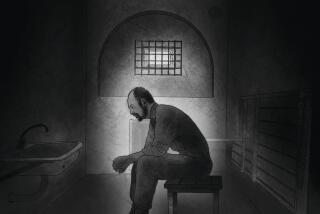Tass Says Moscow Acts to Curb Psychiatric Abuses : A Look at ‘Misha’ in Family Album
- Share via
MOSCOW — Apparently reacting to international and domestic charges of widespread abuse in the field of psychiatry, Soviet authorities have reportedly moved to protect citizens against arbitrary commitment to mental institutions.
Tass, the Soviet news agency, said Monday that the Presidium of the Supreme Soviet has laid down new conditions and procedures for providing psychiatric care. Tass did not indicate when the action was taken.
It came after longstanding criticism in the West, and more recently in the Soviet press, charging that innocent people had been confined to psychiatric clinics for years without adequate cause.
And it appeared to be another step in a campaign by the Soviet Union to rejoin the World Psychiatric Assn., which it left in 1982 shortly before it was to be expelled on charges that it was abusing the practice of psychiatry in order to punish political dissenters.
Western observers in Moscow said they will wait until the new rules have been in effect for a while before deciding whether they constitute a liberalizing step.
Tass said the new rules and procedures provide for “legal guarantees against possible errors and malpractices in providing psychiatric assistance to the population.”
Among other things, Tass said, the order “establishes rules for the original examination, the rendering of psychiatric aid and the emergency hospitalization of mental patients posing a danger to themselves and others.”
Tass said the order specifies that chief psychiatrists of health agencies--as opposed to doctors working for the police or the security agency, the KGB--must exercise control over the medical treatment of persons confined for mental illness.
Compulsory treatment of mental patients who have committed crimes will now have to be performed at mental hospitals of the health services, the Tass account said. In the past, dissidents have reported, such treatment has been performed by doctors in special clinics for the Ministry of Internal Affairs, the national police agency.
Another new provision, Tass said, would allow patients and their relatives or other lawful representatives to challenge a decision on confinement for psychiatric care. It said citizens are to be guaranteed a lawyer to protect their rights.
Tass said that in a separate move, the Presidium of the Supreme Soviet of the Russian Federation, the largest of the 15 republics that make up the Soviet Union, has rewritten its law to make it a crime to commit “a patently healthy person” to a mental hospital.
Model for the Nation
The criminal code of the federation usually serves as the basis for laws in the rest of the nation.
Amnesty International, the London-based human rights organizations, and similar groups have said that more than 100 Soviet dissidents have been placed in psychiatric clinics, even though they were not mentally ill.
Nearly 200 political prisoners were released last year, but dissidents contend that dozens of persons are still held in psychiatric hospitals or clinics. In recent weeks, some of these have also been released.
As recently as last year, Serafim Yevsukov, a former navigator with Aeroflot, the Soviet airline, was placed in a psychiatric hospital and given powerful tranquilizing drugs after he demonstrated in Moscow for the right to emigrate. Yevsukov and his family were later given permission to leave the country and now live in the United States.
Also last year, in February, a prominent Soviet dissident psychiatrist, Anatoly Koryagin, was released from a labor camp and allowed to leave the country. He had documented psychiatric abuses before he was sent to prison for “anti-Soviet slander.”
An article that appeared in Komsomolskaya Pravda in November, describing the arbitrary confinement of a Leningrad woman who had criticized her employers, tended to support Koryagin’s charges.
The article did not mention the charge that psychiatry was widely used to punish dissidents. But it said that Moscow psychiatrists interpreted symptoms of schizophrenia so broadly that “any quite healthy person may land in a clinic” for an indefinite stay.
Until now, there has been no way to challenge such a psychiatric decision. The relatives of some patients have never been told the name of the doctor involved or the nature of the treatment.
The issue of improper confinement by psychiatrists has been receiving more and more attention in the Soviet press as a result of the policy of glasnost, or openness, introduced by Soviet leader Mikhail S. Gorbachev.
Visit by U.S. Psychiatrists
Last summer the Soviet Union invited members of the American Psychiatric Assn. to visit mental institutions here, possibly as part of the campaign for readmittance to the World Psychiatric Assn.
At the time, Robert van Voren, the general secretary of the International Assn. on Political Use of Psychiatry, said the move seemed to be in accord with Moscow’s goal of getting back into the organization.
“Getting back in is a major goal,” Van Voren told the British news agency Reuters in July. “It was a huge loss of prestige to have to leave.”
More to Read
Sign up for Essential California
The most important California stories and recommendations in your inbox every morning.
You may occasionally receive promotional content from the Los Angeles Times.













